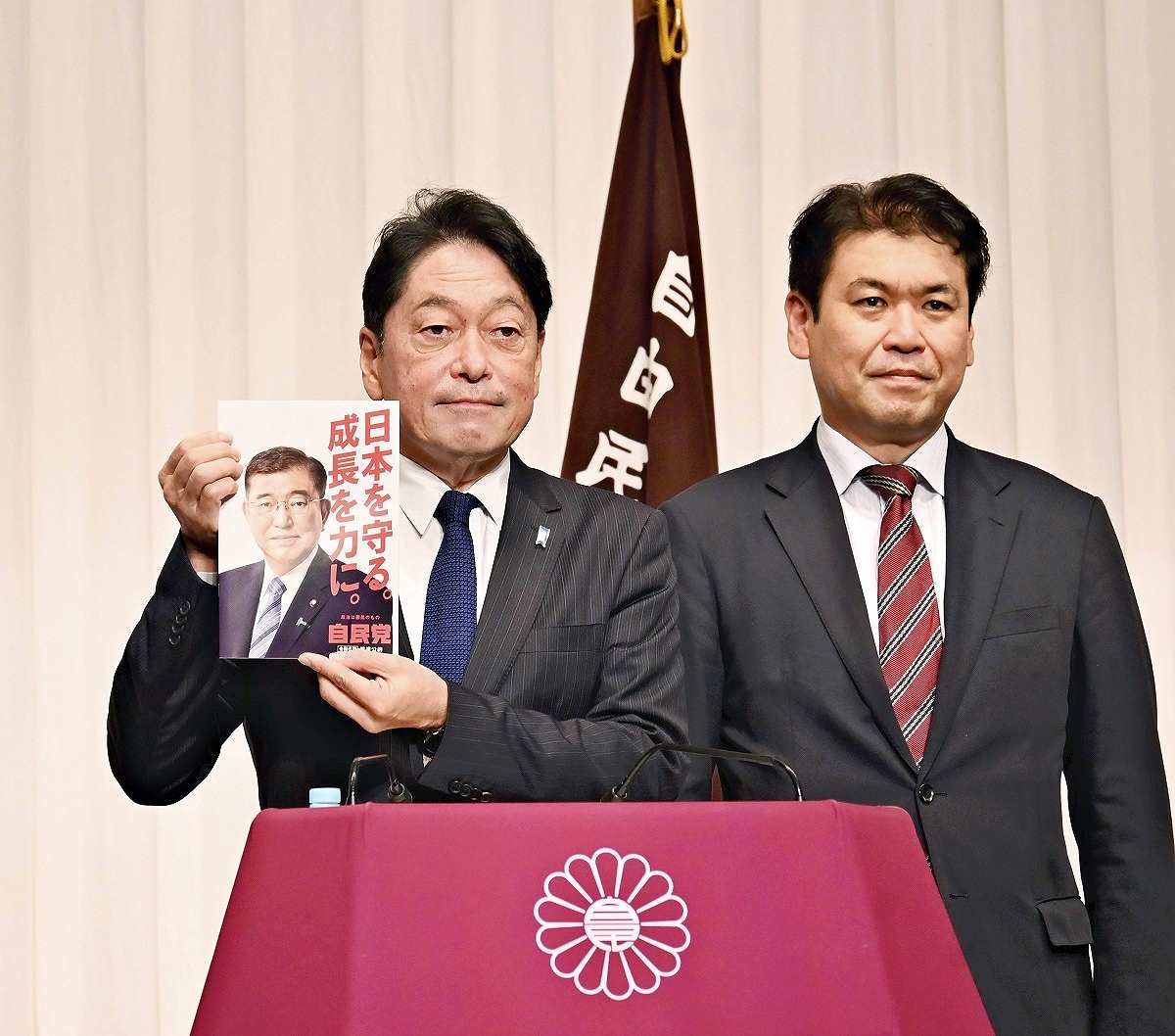LDP Campaign Platform Includes Many Kishida Policies; Relatively Light on Ideas from Ishiba

Itsunori Onodera, the chairperson of the LDP Policy Research Council, announces the LDP’s campaign platform at the party headquarters on Thursday.
17:41 JST, October 11, 2024
The ruling Liberal Democratic Party’s campaign platform for the House of Representatives election maintains continuity with the policies of the previous Cabinet of former Prime Minister Fumio Kishida, while leaving out many ideas of current Prime Minister Shigeru Ishiba.
Due to the briefness of the election preparation period, the LDP apparently was not able to take time to coordinate opinions within the party, making it difficult for them to put out new policies. As for political activity funds provided by the party to its member lawmakers, the platform promises to abolish the funds in the future, showing the party’s willingness to reform itself.
Continuing Kishida policies
“Policies and campaign promises mean something only when they are realized. We should not let them be pie-in-the-sky ideas,” Itsunori Onodera, the chairperson of the LDP’s Policy Research Council, stressed Thursday at a press conference where he announced the party’s campaign platform. The platform includes some of Ishiba’s long-standing ideas, such as moving forward on preparations to create a disaster management agency, promoting regional revitalization and improving the treatment of Self-Defense Forces personnel.
However, economic policies in the platform are aimed at achieving wage increases that exceed inflation. In the field of social security, it stipulates the establishment of a sustainable social security system covering all generations. These campaign promises are in line with the content of the Basic Policy on Economic and Fiscal Management and Reform 2024 compiled by the previous Cabinet in June.
With regard to diplomatic and security policies, during the LDP presidential election, Ishiba made pledges including creating an Asian version of NATO and revising the Japan-U.S. Status of Forces Agreement. However, establishing an Asian NATO would require amending the Constitution so that Japan could fully exercise the right of collective self-defense, which many people believe would be difficult to accomplish. The prospect of revising the Status of Forces Agreement has also prompted concern both inside and outside of the party from the perspective of maintaining the Japan-U.S alliance.
For these reasons, the platform avoids mentioning the Asian NATO idea by name. Instead, with that concept in mind, it promises that Japan “will take the lead in promoting measures to ensure regional security and stability.” With regard to the Status of Forces Agreement, the platform only states that the party “will aim for a desirable state.”
Abolishment in future
While Ishiba was positive about allowing married couples to use separate surnames if they wish, the platform does not specify a clear stance on the issue; it states that the party will work to build consensus on what the surname system should be like. “I think the party leadership wanted to avoid causing ripples by writing that the issue has not been sufficiently discussed yet,” a former Cabinet minister said.
Regarding political activity funds, some LDP members are taking a cautious stance about abolishing them, but the platform reflects Ishiba’s perspective, stating that the LDP will make efforts to ensure the transparency of the funds and establish a third-party auditing organization, with an eye on the possibility of abolishing the funds in the future. This pledge is in line with what opposition parties have advocated.
During a debate between party leaders Wednesday, however, Ishiba admitted the possibility of LDP members using the funds for their election campaigns. “It is easy to say they should be abolished. But political activities need a lot of money, and there are limitations on how much we can cut the funds provided to lawmakers,” an LDP member said.
Top Articles in Politics
-

Japan PM Takaichi’s Cabinet Resigns en Masse
-

Sanae Takaichi Elected Prime Minister of Japan; Keeps All Cabinet Appointees from Previous Term
-

Japan’s Govt to Submit Road Map for Growth Strategy in March, PM Takaichi to Announce in Upcoming Policy Speech
-

LDP Wins Historic Landslide Victory
-

LDP Wins Landslide Victory, Secures Single-party Majority; Ruling Coalition with JIP Poised to Secure Over 300 seats (UPDATE 1)
JN ACCESS RANKING
-

Producer Behind Pop Group XG Arrested for Cocaine Possession
-

Japan PM Takaichi’s Cabinet Resigns en Masse
-

Japan Institute to Use Domestic Commercial Optical Lattice Clock to Set Japan Standard Time
-

Man Infected with Measles Reportedly Dined at Restaurant in Tokyo Station
-

Israeli Ambassador to Japan Speaks about Japan’s Role in the Reconstruction of Gaza





















